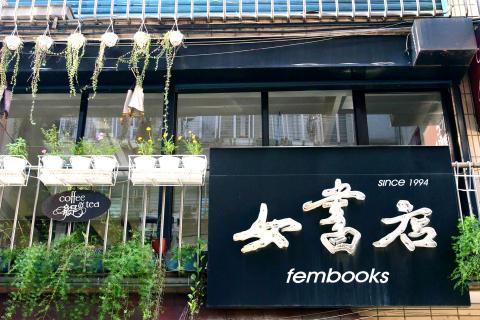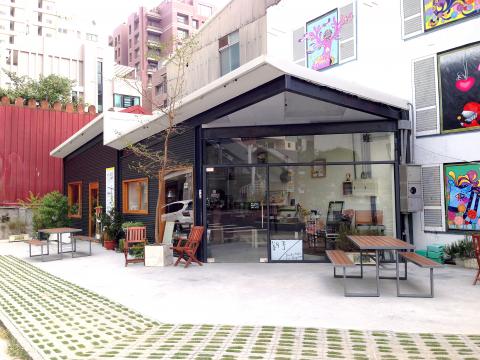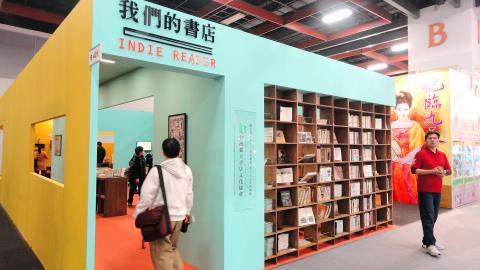Edward Su (蘇至弘) says business for independent bookstores has gone from bad to worse. Su, who operates NTHU Books (水木書苑) a bookstore at Hsinchu’s National Tsing Hua University (國立清華大學), has seen his profits disappear.
To make up for a slump in book sales, Su has expanded the range of products he sells to include university souvenirs and stationery, CDs and coffee. But business hasn’t improved.
“Last year, the bookstore was about NT$700,000 in the red,” Su said.

Photo courtesy of Fembooks
Times weren’t always so tough. Liao Ying-liang (廖英良), owner of Thus Books (東海書苑) in Greater Taichung, said most independent bookstores did good business during the 1980s and early 1990s.
“But things have changed since the turn of the century,” Liao said, citing the purchase of local online bookstore Books.com.tw (博客來) by President Chain Store Corporation (統一超商) in 2000, which allowed readers to order books online and pick them up at any 7-Eleven.
Su and Liao say the proliferation of Internet access and the consequential boom of book e-commerce are major factors driving the change in the book market.

Photo courtesy of Cheng Yu-ting
“My bookstore’s operating costs now rely on selling coffee … The revenue generated by books can’t even pay my electricity bills in the summer,” Liao says.
COMMUNITY CULTURE
In March last year, Liao, Su and several other indie bookshop owners initiated the Taiwan Association for Independent Bookshop Culture (TAIBC, 台灣獨立書店文化協會), joining forces not only for their own financial survival, but also to revive the “culture” of independent bookstores.

Photo by Tang Hsiang-yi, Taipei Times
Liao says there are 30 members, of which bookstore owner’s account for one third. “The rest are likeminded partners from all walks of life,” Liao said.
Liao says independent bookstores play an integral part in supporting social movements, alternative culture and community development and building a cultural scene that encourages civic participation on public issues.
“Many people get their ‘FXXk the Government’ stickers and anti-nuclear power flags from independent bookstores across the country,” Liao said, citing protests against demolitions in Dapu Village (大埔) in Miaoli County’s Jhunan Township (竹南), and rallies held to stop the building of the Fourth Nuclear Power Plant in New Taipei City.
The association has recently organized a series of talks on topics that consider the definition, social value, survival and future development of independent bookstores.
TAIBC set up a booth titled Indie Reader (我們的書店) at the Taipei International Book Exhibition (TIBE,台北國際書展). It displayed books on art, feminism, sociology, organic farming and picture books for kids from about 10 independent bookstores .
Unlike most TIBE exhibitors, Indie Reader didn’t rely on attracting customers with sales discounts, but instead encouraged readers to revisit the pleasure of spending time among bookshelves and the smell of coffee.
Liao says he used the book fair as an opportunity to communicate with general readers, who might only buy books on the bestseller’s list, to educate them of what other choices are available.
“Large book chains or online bookstores don’t promote books they think are hard to sell. Some books just disappear into a sea of books, which in turn narrows reader’s choices,” Liao said.
“Dorothy Behre, a visitor to the booth, bought Why Sell Books at All? (聽見書店的聲音), a book published by TAIBC that tells the stories of 28 independent bookstores, some of which are members of the organization.
Behre said she enjoys visiting independent bookstores in her US hometown and her current home in Greater Kaohsiung.
“I like the zines [small circulation of self-published work] and the cozy reading environment in indie bookstores,” she said.
SURVIVING IN A DIGITAL AGE
During one of the 12 talks held at Indie Reader during TIBE, Hsia Chu-joe (夏鑄九), professor emeritus at National Taiwan University’s Graduate Institute of Building and Planning, offered ideas on how independent bookstores can survive in the age of the Internet.
Hsia said he shares TAIBC’s motive to introduce the cultural significance of independent bookstores, and that by forming a group, indie booksellers can come up with a strategy to buy books together in larger quantities to reduce the cost.
“As a repeat user of indie bookstores, I see how interpersonal relationships grow between the owner and readers or among readers, which doesn’t happen in large book chains or in online bookstores” Hsia said.
Hsia advises indie booksellers to explore the “experience economy” and offer interactive events for its readers that leave a lasting impression. Hsia cites Tonshan Bookstore (唐山書店), which provided access to banned books during the 1980s an example.
“Even the act of buying books excited people,” he said.
Hsia added that although one can find pretty much any title online, “you can’t find the cultural ambience unique to each independent bookstore when you buy books online.”
Le Pigeonnier, an independent book store specializing in French titles, has established a client base with regular cultural activities, including author’s talks, handicraft workshops and book discussion clubs.
“At first, we used French food as a ruse to attract readers. Now they come just for the events. Free food isn’t the point anymore,” said senior bookstore staff Amelie Sun (孫美麗).
Sun says a solid client base hasn’t sustained the 15-year-old bookstore financially, as it ran at a loss for the first 10 years.
“We capitalized on our niche: importing books from France, to get contracts with university libraries, academic institutions and basically anyone who may need French books,” Sun said.
“Business didn’t improve overnight. It took time to earn other people’s trust and build a long term working relationship,” Sun added.

Three big changes have transformed the landscape of Taiwan’s local patronage factions: Increasing Democratic Progressive Party (DPP) involvement, rising new factions and the Chinese Nationalist Party’s (KMT) significantly weakened control. GREEN FACTIONS It is said that “south of the Zhuoshui River (濁水溪), there is no blue-green divide,” meaning that from Yunlin County south there is no difference between KMT and DPP politicians. This is not always true, but there is more than a grain of truth to it. Traditionally, DPP factions are viewed as national entities, with their primary function to secure plum positions in the party and government. This is not unusual

Mongolian influencer Anudari Daarya looks effortlessly glamorous and carefree in her social media posts — but the classically trained pianist’s road to acceptance as a transgender artist has been anything but easy. She is one of a growing number of Mongolian LGBTQ youth challenging stereotypes and fighting for acceptance through media representation in the socially conservative country. LGBTQ Mongolians often hide their identities from their employers and colleagues for fear of discrimination, with a survey by the non-profit LGBT Centre Mongolia showing that only 20 percent of people felt comfortable coming out at work. Daarya, 25, said she has faced discrimination since she

April 21 to April 27 Hsieh Er’s (謝娥) political fortunes were rising fast after she got out of jail and joined the Chinese Nationalist Party (KMT) in December 1945. Not only did she hold key positions in various committees, she was elected the only woman on the Taipei City Council and headed to Nanjing in 1946 as the sole Taiwanese female representative to the National Constituent Assembly. With the support of first lady Soong May-ling (宋美齡), she started the Taipei Women’s Association and Taiwan Provincial Women’s Association, where she

More than 75 years after the publication of Nineteen Eighty-Four, the Orwellian phrase “Big Brother is watching you” has become so familiar to most of the Taiwanese public that even those who haven’t read the novel recognize it. That phrase has now been given a new look by amateur translator Tsiu Ing-sing (周盈成), who recently completed the first full Taiwanese translation of George Orwell’s dystopian classic. Tsiu — who completed the nearly 160,000-word project in his spare time over four years — said his goal was to “prove it possible” that foreign literature could be rendered in Taiwanese. The translation is part of